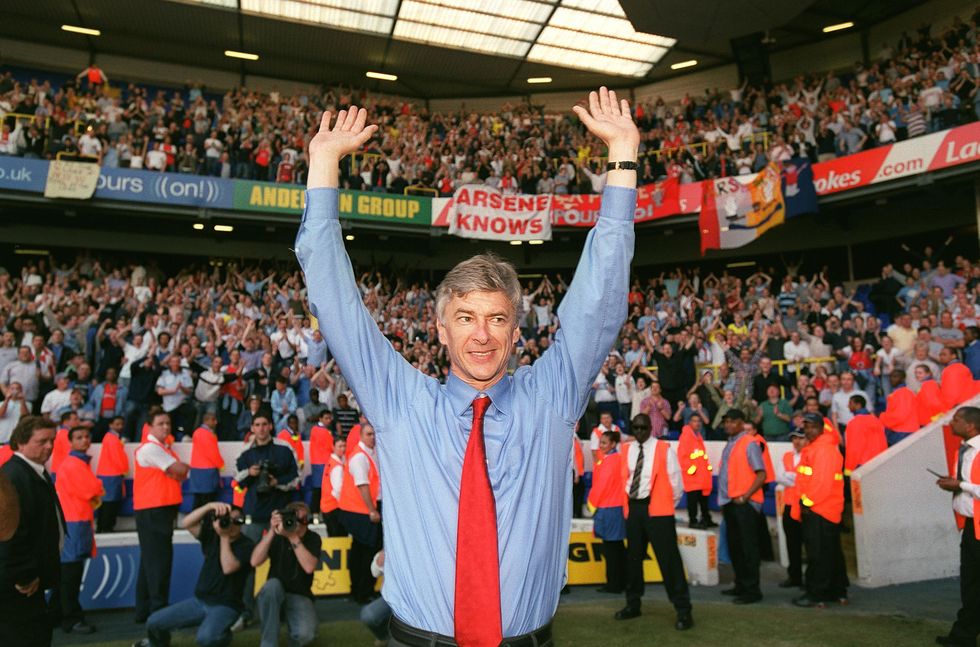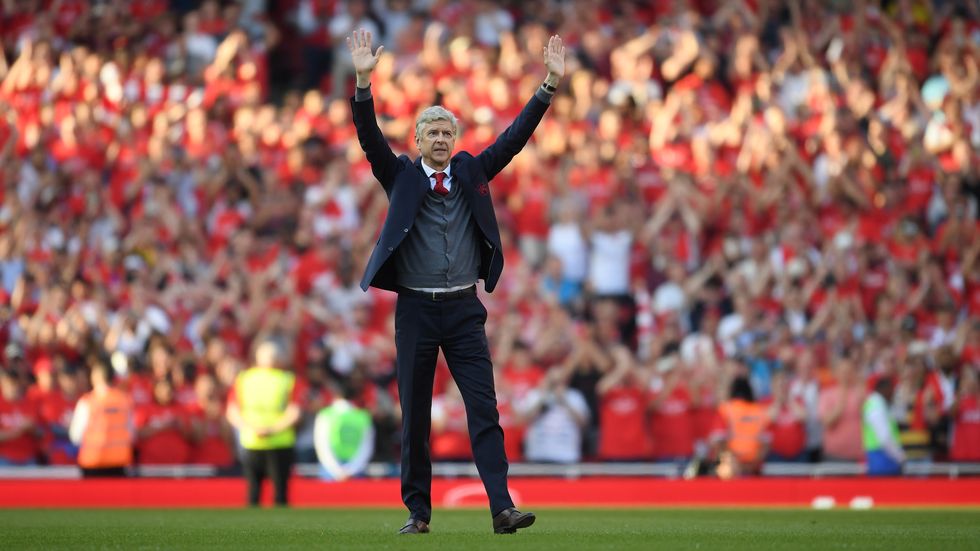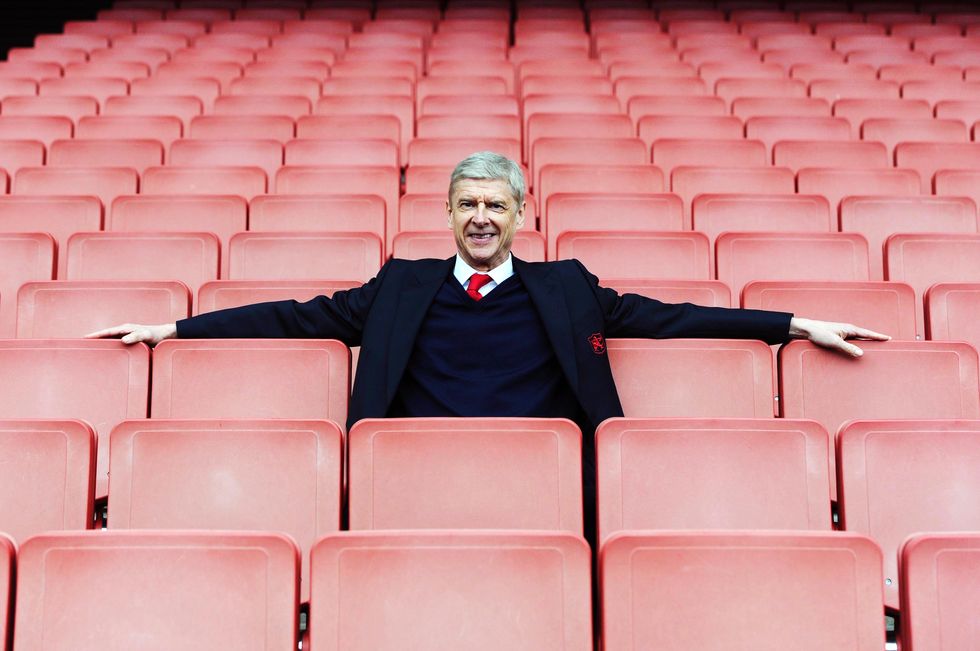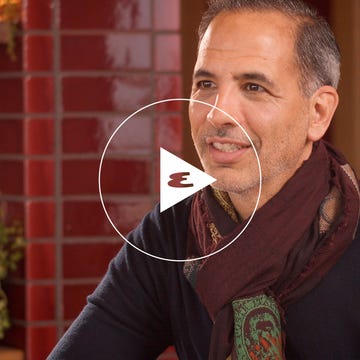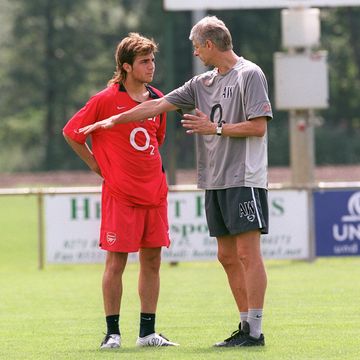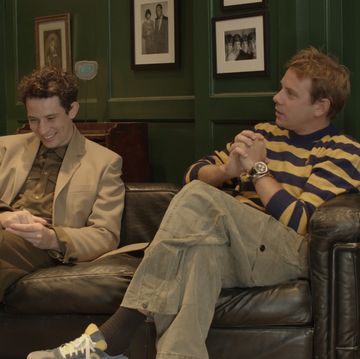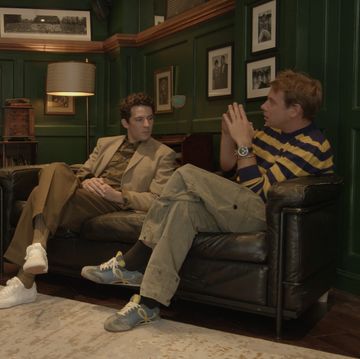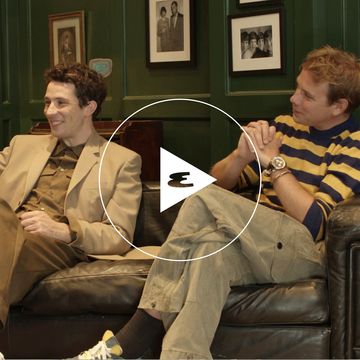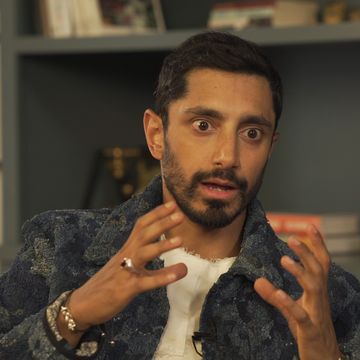On Friday night, as part of Esquire Townhouse 2020 with Breitling, legendary Arsenal manager Arsène Wenger sat down for an intimate chat with broadcaster Mark Chapman, at the Standard Hotel in London, about the highs, lows and lessons he learned from his time at the top of the professional game.
The 70-year-old went into detail on his humble childhood in the French village of Duttlenheim, where his lifelong passion for football was forged. He opened up about the hardest moments of his managerial career, and gave us the skinny on how he transformed his Arsenal team into Invincibles. Being Arsène Wenger, he also managed to sneak in a few gut-punchingly profound insights on the meaning of life. Naturally.
Below, we've listed eight of the most interesting excerpts from the discussion. Watch the highlight video above, and check out the rest of our Esquire Townhouse 2020 content here.
Arsène Wenger actually started his Arsenal career off with a loss
We know what you're thinking: no he didn't. He beat Blackburn 2-0 at Highbury in 1996, thanks to goals from Ian Wright. You think we're lying to you.
But we're not! In his interview, Wenger revealed that he visited the dressing room at half-time during a UEFA Cup match against Borussia Mönchengladbach on 25 September. He'd been spectating, but was asked to speak to the team with the score levelled at 1-1.
"I took Tony Adams out of the game at half-time, and we lost the game. So they must have thought that this guy is completely mad," he said. "But I thought as well that it was quite exciting, I went back to Japan and I thought, certainly that was not the best of my decisions, and that makes my job a bit harder. But at some stage that is what football is about, you have to make decisions.” Arsenal went on to lose 3-2, thanks to a goal by Andrzej Juskowiak in the 89th minute.
He drafted in dancers, skateboarders and adventurers to inspire his Arsenal team
A manager's words of encouragement cant only go so far. Sometimes, inspiration can come from an unlikely source – like one of Madonna's backing dancers.
"Every two months I invited somebody to talk to the players – somebody who did something special," he told us. "The guy who went to the North Pole, a guy who was a dancer with Madonna, and they talked about their experience. A guy who was a world champion in skateboarding."
These people all had something in common, according to Wenger. They had identified their dream career, successfully worked out how they could make it happen, ridded themselves of negative thoughts and, finally, dedicated themselves to it 100 per cent.
He thinks men and women generally have different attitudes to competition
Specifically, that guys aren't very good at dealing with the losing part. "I think it’s a basic difference between men and women maybe," he said. "How men hate to lose, and women love more to win. Men hate defeat. They can become very aggressive, they feel humiliated.”
Having said that, he thinks that a preoccupation with failure unites many of history's greatest winners, male or female. “I was in my life in touch with top level performers, and since I’ve stopped, as well, I met many other athletes from other sports. And I tell them, ‘tell me a little bit about where your motivation comes from', and honestly, all of them tell you only what they have lost and could have won. You take winning as OK, it’s normal, but you wonder: why did you lose?"
His Arsenal squad initially baulked at the idea of going unbeaten
The Gunners legend originally stated that his team could go a whole season unbeaten in 2002/2003, and was laughed at by the press when his team ultimately faltered and lost out to Manchester United. Wenger was surprised by the lack of conviction and confidence in his team's performances, and asked them about it on the training pitch.
"They said, ‘Your target was too high, there was too much pressure [...] I think it’s Martin Keown who told me it was too much pressure," he revealed to us. What happened next must have surely came as a surprise to his squad. "Stupidly, I said ‘I think you can do it.’ So sometimes it shows, don’t be scared to be ambitious."
The team proceeded to go on a 49-game unbeaten run in the league, winning the Premiership at a canter and earning the name 'The Invincibles'. What was it that made them so special? "The players owned the way we wanted to play, they had a kind of charisma, they refused to be mediocre. They didn’t accept losing football matches. They owned that desire for perfection and stimulated each other," he told us. "Sometimes I thought, ‘Why am I paid so much money to do this job?’ It is so simple, it is so easy."
He knocked on doors around Cambridge in a bid to learn English
Learning English had been a long-term goal for Wenger, ever since he was a kid. "When I was a very young boy, I wanted to understand the world around me, and I felt at the time I was playing football, my friends went to the beach and I thought, ‘I don’t want to spend my life without speaking English."
So at the age of 29, while still a player in France, Wenger travelled to Cambridge to learn English. To be clear, he didn't have a place on a university course – in fact, he didn't even have a place to stay. When he arrived, he had to knock on doors to find shelter.
“Now my daughter is at Cambridge university, and I never could find the lady again, where she gave me a room to live in. I just asked, ‘look I am French, can you help me?’ She said ‘I have a room for you’, and then the next day I make the tests and I was very average in English, and they put me in a class and I saw that the lady where I lived was the teacher of the class.”
He has a philosophical attitude to player departures
Following Arsenal's move to the Emirates Stadium in 2006, Arsène Wenger was forced to keep to a tight budget. That meant avoiding big money signings, developing players through the club's youth system and, eventually, selling them off to the highest bidders.
Fans were often disappointed and angry to see players like Cesc Fabregas, Robin Van Persie and Samir Nasri jump ship for Premier League and Champions League rivals, but Wenger doesn't hold a grudge against any of them.
“Basically, if you can help people to develop their talent and be good, you want them to play for you. But at the end of the day what is the most important is that when you have talent, is to be capable of developing it and feel that you can express it. If it’s for you it’s better, but if it’s somewhere else it’s good as well.”
The role of a football manager has changed radically
When Arsène Wenger left Arsenal in 2017, he was the last of an old breed. Much like Alex Ferguson, the Frenchman exercised a huge amount of influence over every single aspect of his club. Nowadays, Directors of Football control much of the transfer activity and forward planning, and modern managers often have to settle for the stripped-back title of Head Coach. They've prove far more disposable than managers of the past, too. For Wenger, their responsibilities have changed a lot.
“A manager today needs to have expertise, to be a strategist, and to be a communicator as well. He needs less to be a specialist to work on the pitch. When I started at the age of 33, it was me and the team on the football pitch," he says. "[The modern manager] is flooded with information, and he has to select the three or four data that can help him to make the right decision. When I started, it was a fight to get information. Today you are flooded with information, and so it’s more of a selective attitude, and the wisdom to select the right data that’s important.”
He didn't see Cesc Fabregas throw the pizza at Alex Ferguson
“I was a specialist at not seeing things. I didn’t see it," he laughed when pushed by Mark Chapman. The infamous incident came after Manchester United ended Arsenal's 49 game unbeaten run in 2004 at Old Trafford, when a tussle in the tunnel ended with a dry cleaning bill for Alex Ferguson. "I have been told who did it, and unfortunately it landed on Alex. But it was a bit Man Utd’s fault because they put the pizzas in our dressing room."
In any case, he thinks that Alex is over it. "In hindsight now it’s funny, I can understand completely that Ferguson was not happy but I think, with a distance, he laughed at it as well. But it is just to show how the fight was big in the corridors. Today, you don’t get away with that anymore. You finish in jail now.”
Special thanks to the Standard Hotel, 10 Argyle St, London WC1H 8EG, standardhotels.com
Like this article? Sign up to our newsletter to get more articles like this delivered straight to your inbox
Need some positivity right now? Subscribe to Esquire now for a hit of style, fitness, culture and advice from the experts

